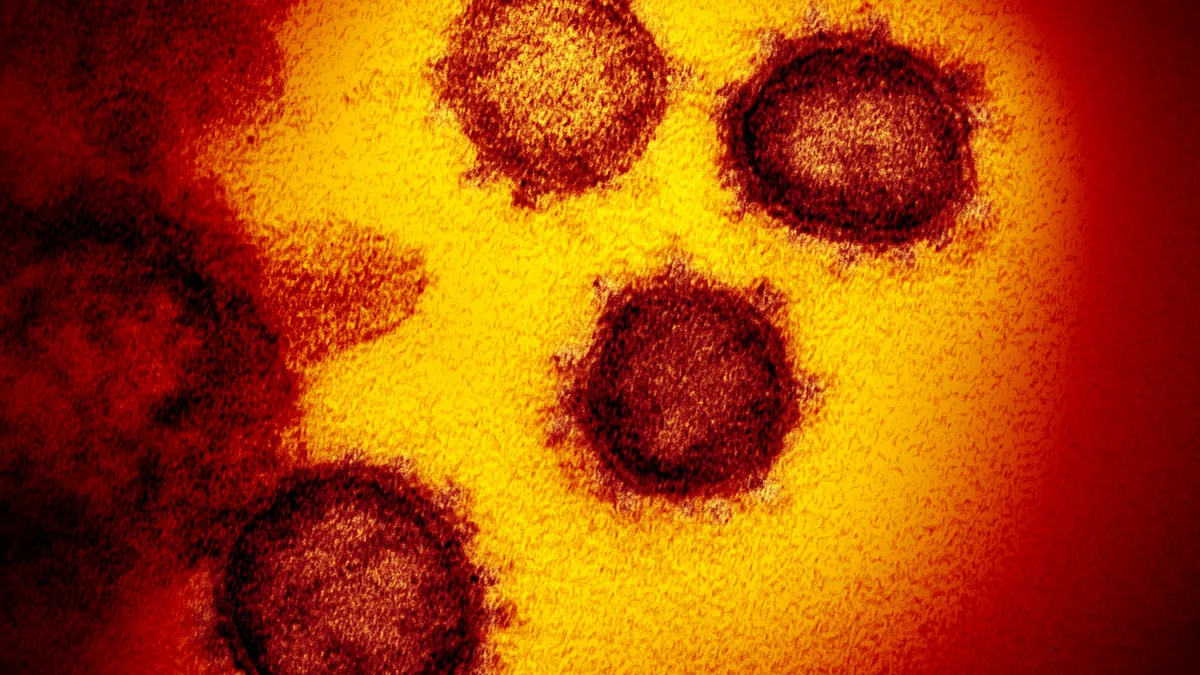Dive Brief:
- Quidel CEO Doug Bryant made a case to investors Thursday that an effective COVID-19 vaccine, when widely available, would not lead to reduced testing demand, arguing the need for the company's tests will persist as the coronavirus mutates.
- The company's stock has been under pressure this week, dropping 28% after an early look at Pfizer and BioNTech's coronavirus vaccine study found the shot to be more than 90% effective at preventing COVID-19.
- Bryant, speaking during an investor day, said he hopes vaccines being developed by several companies are effective, but claimed their use will put the "same pressure on the virus to mutate" and "invite the arrival of a surviving new strain." Mutations, however, won't necessarily mean existing vaccines will be ineffective.
Dive Insight:
Shares of Quidel, and other diagnostic companies that make tests for SARS-CoV-2 and coronavirus antibodies, took a hit on Monday after encouraging news regarding COVID-19 vaccine results from Pfizer and BioNTech.
Wall Street appears to remain skeptical of Quidel's long-term prospects, despite third quarter revenue jumping 276% to $476 million and company expectations of $800 million or more in revenue in the fourth quarter.
The potential negative impact of vaccines was a top concern for analysts in a Q&A session of Thursday's conference call. Bryant tried to reassure investors that mass testing is likely to remain important, even after vaccines are widely distributed.
"There is optimism with the vaccine but there is also appropriate caution," Bryant said. "The coronavirus is constantly mutating." As a result, the virus could behave differently in the future, said Werner Kroll, senior vice president for research and development at Quidel.
The company, Kroll said, is anticipating there will be changes in the coronavirus following the wide availability of vaccines, emphasizing the importance of monitoring and identifying the possible emergence of new variants of SARS-CoV-2.
At the same time, Bryant said Quidel's rapid antigen tests will still "be appropriate" even if the virus mutates.
In the third quarter, Quidel's rapid immunoassay product revenue increased by $295 million to $337 million, with nearly $318 million generated by its Sofia SARS antigen test. Quidel is producing more than 2.1 million of the antigen tests per week and the company expects to make 5 million tests a week by mid-2021.
Writing in a Friday note, Craig-Hallum analyst Alex Nowak backed the company's argument.
"The rationale is a vaccine does not lead to 100% protection, nor is duration of the vaccine known, and management has seen evidence suggesting mutations will arrive," Nowak wrote. "We agree on demand for the symptomatic market, though management believes the same applies to asymptomatic testing, giving an example of testing their own workforce post-vaccine."
A JAMA Viewpoint article published on Friday, however, concludes that while antigen tests may play a key role in rapidly identifying those at highest risk for transmitting disease, test performance for people without symptoms is "poorly understood, and more research on the value of these tests is urgently needed."
Bryant told investors that Quidel has been in touch with a member of President-elect Joe Biden's newly formed COVID-19 task force. Although Bryant did not provide specifics on Thursday about what was discussed, Nowak wrote in his analyst note that "management is hearing antigen testing is central and one comment is for a 7x increase in tests."
The projection comes as the U.S. on Thursday set a daily record of more than 160,000 new coronavirus cases. With the surge in U.S. cases, Quidel is poised to submit an emergency use authorization to FDA for its first at-home COVID-19 test. Bryant said the company is talking with two "very large" consumer-facing companies about potential distribution of the product.
"We feel like we have an obligation to do whatever is necessary here in the U.S. first," Bryant said.
A one-year $65 million National Institutes of Health contract, which began in July, is meant to directly support the addition of new Quidel immunoassay manufacturing lines. The company is committed to COVID-19 testing "after being told by NIH" to produce 1 billion tests in 2022, Nowak wrote. "It is a crazy figure and if even 10% were sold it would beat our forecast."













